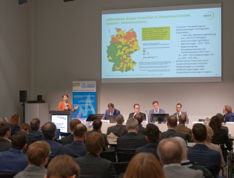The future of climate protection in transport
14 December 2023
21st International Conference on Renewable Mobility: Berlin panel for expert exchange
Berlin, 14.12.2023: The necessary political framework conditions for global climate protection are currently being negotiated both nationally and internationally. Due to a lack of greenhouse gas reductions, the focus is particularly on the transport sector. Given this background, participants at the 21st International Conference on Renewable Mobility – Navigator for sustainable Mobility - on 22nd and 23rd January 2024 in Berlin will discuss tangible solutions and innovation developments for the defossilisation of transport. Solutions and innovations for road transport, aviation and shipping as well as agriculture and forestry will be discussed. Even though electric mobility is becoming increasingly widespread, the combustion engine will continue to play a dominant role in existing vehicles and in heavy-duty applications (on- and off-road). The congress will present the legal framework conditions at EU and national level and discuss whether these promote or hinder the use of renewable fuels.
The economic players concerned, transport companies and vehicle owners find themselves in an increasingly complex, regulated framework, with future CO2 pricing in particular playing a key role. In addition to the future EU-wide emissions trading scheme for transport (ETS 2), the requirements for alternative fuels infrastructure (AFIR) or the fleet limits for cars and commercial vehicles will have a decisive influence on market access for alternative fuels and drive systems. The revised Renewable Energy Directive (RED III) sets comprehensive requirements for national regulations in order to be able to fulfil the new and more ambitious targets of the EU Effort Sharing Regulation by 2030. RED III gives member states the freedom to choose between energy or greenhouse gas reduction quotas. Experience from Germany to date shows that a greenhouse gas reduction quota successfully incentivises greenhouse gas-efficient fuels and can therefore make a greater contribution to climate protection with the same amount of biofuel used. However, experience is not entirely positive and reveals a need for improvement in the requirements of the certification systems and their official monitoring. In this instable market environment, the congress will also address international market perspectives and challenges for production and trade.
More than 700 participants are once again expected to attend Europe's largest conference on renewable mobility from 22nd to 23rd January 2024 at City Cube Berlin. In 15 sessions with more than 60 high-level experts, the economic and political challenges as well as future opportunities for the further development and innovation of renewable fuels will be discussed.






















